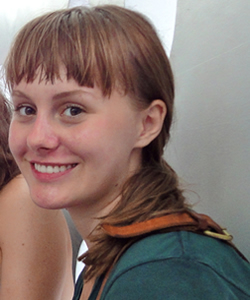On second thought, “come alive” is probably an unfortunate choice of words, since my attention was drawn to said animal in the weeks preceding the Tabaski holiday, a day where Dakar essentially transforms into a sheep slaughterhouse in the name of God. One of the most anticipated holidays in the Muslim religion for Senegal (of which about 95 percent are Muslims), Tabaski honors Abraham’'s faith in his willingness to sacrifice his son, before God provided a sheep in lieu.
Despite my dread, I was pleasantly surprised by the Tabaski holiday, which fell a week before Thanksgiving. The tiny producer of “baas” outside my window was not, in fact, sacrificed (yet); instead, its voice was joined in a chorus with a much bigger sheep my family purchased the night before. A man in dark sunglasses, gripping a cigarette in his teeth, came over to do the deed (my family is all women), and I watched with interest as he cut its throat and carved its entirety. Meanwhile, the women enacted the dance of sheep preparation and exchange: chopping, grilling, and plopping large raw chunks into plastic bags—the tradition is that one third goes to the family, one third to friends, and one third to the poor. The more I thought about it, the more Tabaski resembles our Thanksgiving in the preeminence of sharing and feasting, and what'’s more, in a purer form (imagine if all Americans killed their own turkey).
Unfortunately, I might also argue that Tabaski resembles another dominant American holiday with the pervasive presence of consumerism. In a country with an unemployment rate around 50 percent, each family must pay upwards of $100 dollars for a sheep (and many families buy more than one). The two holidays I have experienced here have been more notable for the flood of preparation that precedes them than the actual celebrations themselves. Much money and planning goes into getting an outfit at the tailor and purchasing the best weave or wig—, combining two of Dakar’s favorite things: impeccable appearances and Islam.
Neither of these tendencies is at all unwarranted on the surface, but I'’ve seen, like so many other trends in Senegal, how they can go too far, particularly in a country so plagued by poverty. For example, when a family can’'t afford to feed its children, but still finds a way to buy a Tabaski sheep, or when women die or seriously impair their health from efforts to lighten their skin or gain weight; these actions are bizarrely irrational from an American perspective, but gravely real here.
The dark imprint of Islam in Dakar is only too evident for me in many of the social and political structures at the root of Senegal’'s problems: the subjugation of women (Senegal was matriarchal before Islam), polygamy, political corruption, and even in part, education. Senegal does not have the same idolatry of political leaders as in other African countries; instead of president’s' portraits, you see marabouts (in this case, Islamic brotherhood leaders) staring at you anywhere from public transport to t-shirts and necklaces to shop signs. The dichotomy is appropriate, since often times the leaders of Muslim brotherhoods have more power than the political leaders themselves, both in determining elections, and in influencing decisions.
Another example is the beggar children called talibés that flood Dakar’s streets. Students of supposed Qur'anic schools called daaras, these children are forced to beg for their abusive teachers, —also called marabouts. Despite the fact that Senegal is officially secular and has officially outlawed begging, these schools continue to exist, perpetuated by the social veneration of Islam and the religion’'s requirement for alms.
It's unfortunate that the dire exploitation of talibés (students) is disguised by the Trojan horse of Qur'anic learning, but it's not inconsistent with other Islamic trends in Senegal. Nor does the hypocrisy end there. Senegal is particularly interesting for the alleged non-contradictory coexistence of Islam and a persisting belief in “Jinnah” spirits and the power of (the third type of marabout) spiritual leaders. However, I think one would be hard-pressed to find a religion that does live in perfect harmony with contemporary, Western understandings of society. From Trojan horse to Tabaski sheep, Muslim representations color Senegalese culture for better or worse. While I'll miss the call to prayer, for example, from my Senegalese “soundtrack,” I'll always associate the “baas” of the sheep with other, more pressing, social sacrifices made in the name of Islam in Senegal.

